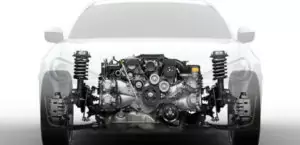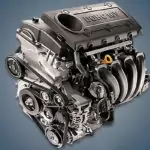The 2.4-liter Hyundai-Kia G4KJ or 2.4 GDi petrol engine has been produced since 2009 and is installed on such popular models as Optima, Sonata, Santa Fe, Sorento and Sportage. This unit is distinguished by the presence of a GDi direct injection system and a block of balancing shafts.
In 2010, a new 2.4-liter engine of the Theta II line, equipped with GDi direct fuel injection, debuted on the American versions of the Hyundai Sonata YF and Kia Optima TF sedans. In all other respects, this is a typical power unit of the line with an aluminum cylinder block, cast-iron sleeves and an open cooling jacket, CVVT phase regulators on two shafts, a 16-valve head without hydraulic compensators, a timing chain and VCM and VIS systems in the intake. Like many large displacement 4-cylinder engines, it is equipped with a block of balancer shafts.
This engine has been constantly upgraded and the main innovations are the appearance of oil nozzles for cooling the pistons and the E-CVVT phase regulator on the intake camshaft.
Theta 2.4L family: G4KC, G4KE, G4KG, G4KJ, G4KK.
The engine was installed on:
- Hyundai Grandeur 5 (HG) in 2011 – 2016; Grandeur 6 (IG) in 2016 – 2019;
- Hyundai Santa Fe 3 (DM) in 2012 – 2018; Santa Fe 4 (TM) in 2018 – 2020;
- Hyundai Sonata 6 (YF) in 2010 – 2015; Sonata 7 (LF) in 2014 – 2020;
- Hyundai Tucson 3 (TL) in 2015 – 2021;
- Kia Cadenza 1 (VG) in 2011 – 2016; Cadenza 2 (YG) in 2016 – 2019;
- Kia Optima 3 (TF) in 2010 – 2015; Optima 4 (JF) in 2015 – 2020;
- Kia Sorento 2 (XM) in 2012 – 2014; Sorento 3 (UM) in 2014 – 2020;
- Kia Sportage 4 (QL) in 2015 – 2021.
Specifications
| Production years | since 2009 |
| Displacement, cc | 2359 |
| Fuel system | direct injection |
| Power output, hp | 180 – 201 |
| Torque output, Nm | 231 – 251 |
| Cylinder block | aluminum R4 |
| Block head | aluminum 16v |
| Cylinder bore, mm | 88 |
| Piston stroke, mm | 97 |
| Compression ratio | 11.3 |
| Hydraulic lifters | no |
| Timing drive | chain |
| Phase regulator | yes |
| Turbocharging | no |
| Recommended engine oil | 5W-20, 5W-30 |
| Engine oil capacity, liter | 5.8 |
| Fuel type | petrol |
| Euro standards | EURO 5/6 |
| Fuel consumption, L/100 km (for Kia Sorento Prime 2016) — city — highway — combined |
12.9 7.5 9.4 |
| Engine lifespan, km | ~300 000 |
| Weight, kg | 128.4 |
Disadvantages of the Hyundai G4KJ engine
- The most famous problem with this engine is the wedge due to the rotation of the liners and the reason for the rapid wear of the balance shaft block combined with the oil pump. In South Korea and the USA, a large-scale recall campaign was carried out for such engines.
- The second recall campaign was carried out due to massive failures of the E-CVVT phase regulator. Usually it was possible to manage only by replacing its cover, under which grease fell.
- On these engines, oil nozzles for cooling the pistons appeared quite quickly, and the problem with scuffing due to the ingress of catalyst crumbs is not common in them. But an aluminum block with an open cooling jacket and thin cast-iron liners very quickly leads to overheating, then an ellipse of cylinders and oil consumption appear.
- Like any engine with direct fuel injection, this one suffers from soot on the valves, and on specialized forums they complain about the short life of the air conditioning compressor clutch bearing and regular lubricant leaks from under the valve cover or through the crankshaft oil seals.






